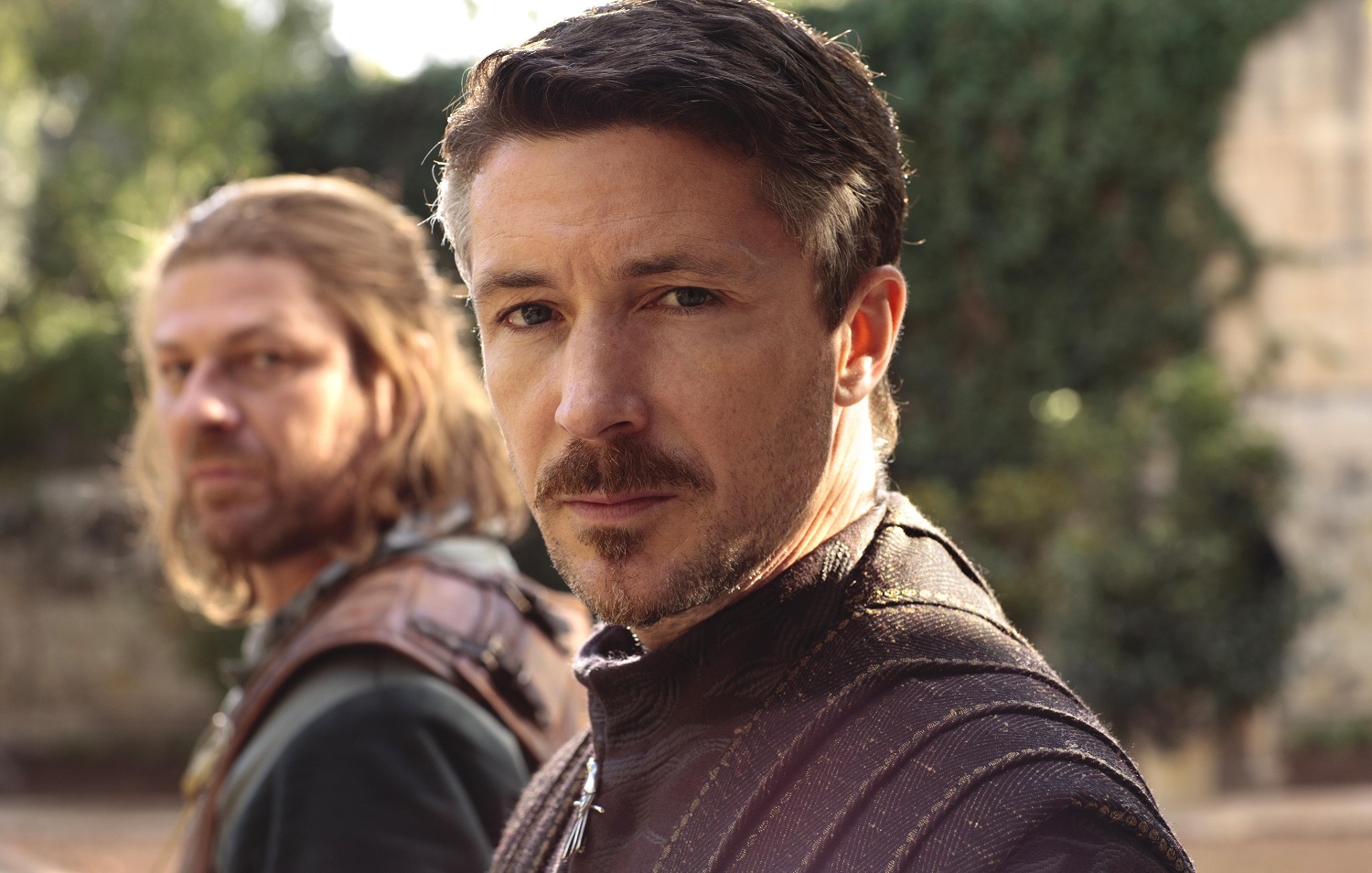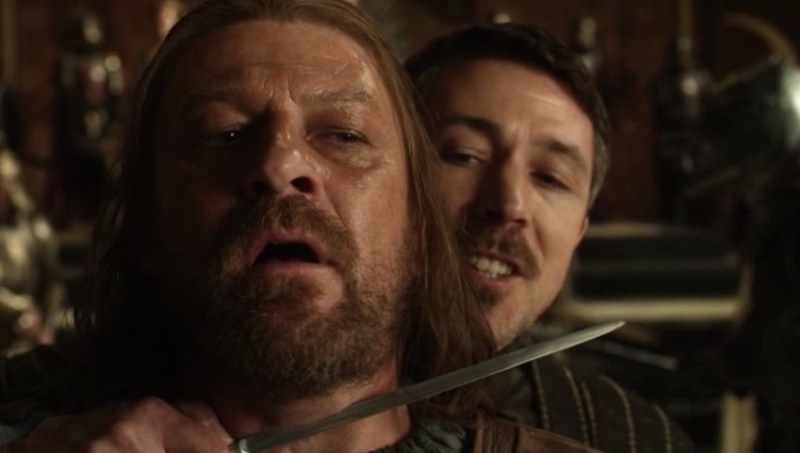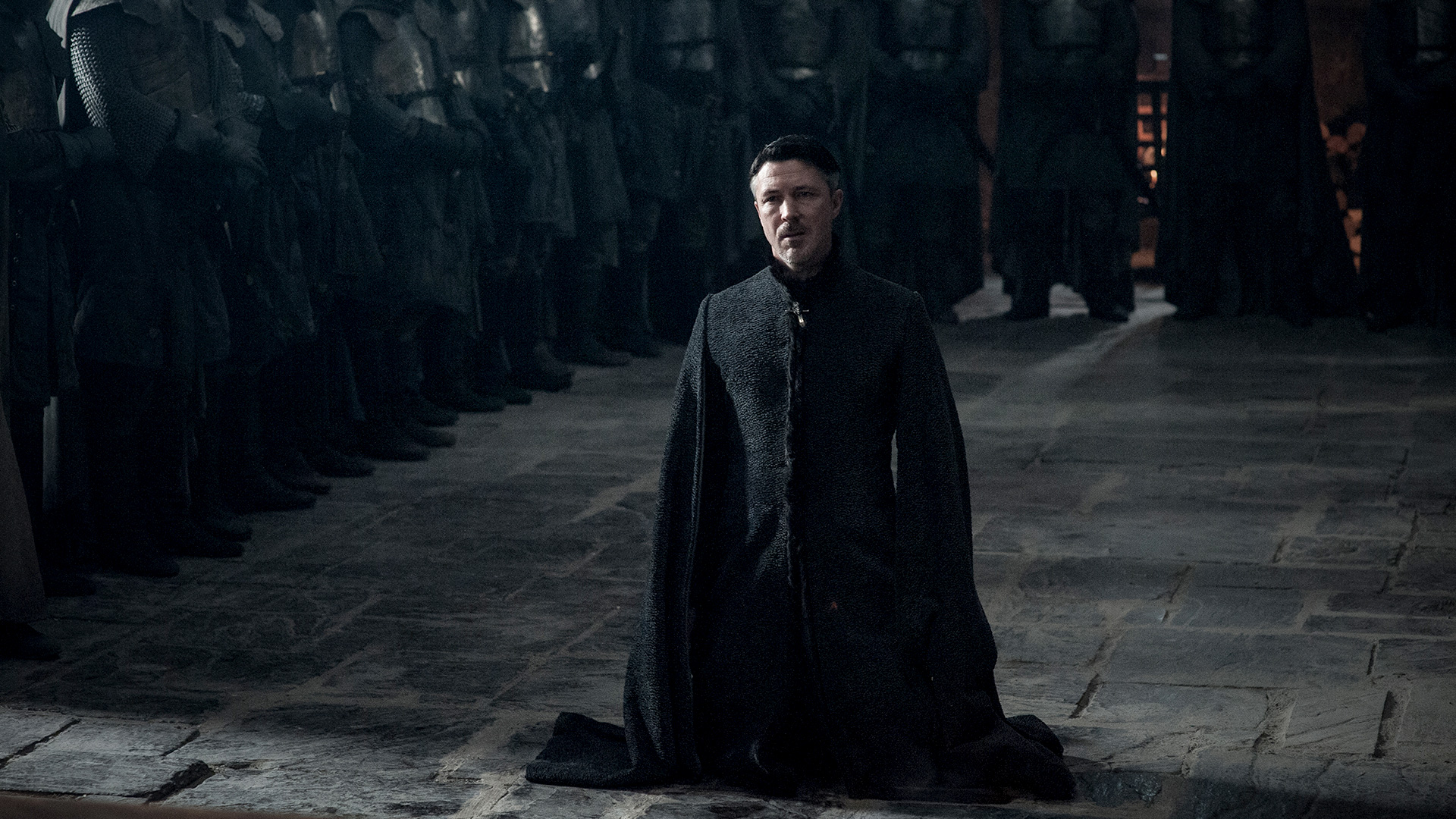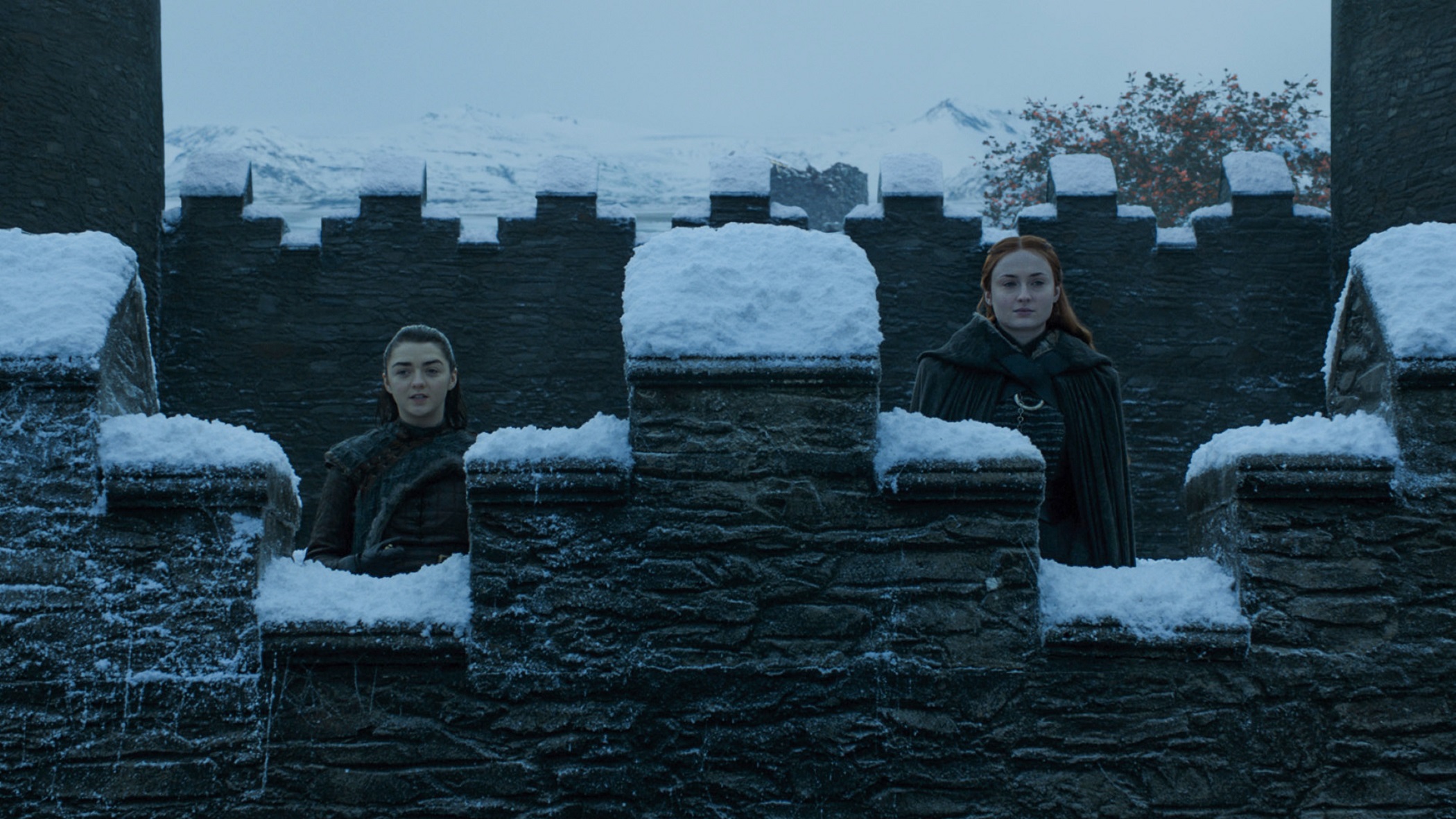by Joe Buckley
In Game of Thrones, many characters are used to represent many themes. We have our warriors, our lovers, our mothers and our brothers. Thanks to the excellent writing of the characters, some represent multiple factions at once. But every so often, there is a character who is undeniably representative of a theme or idea.
Two such men would be Lord Eddard Stark and Lord Petyr Baelish, aka Littlefinger. Ned is the epitome of family, honour and solemness, he is the patriarch of the main family of the series and the physical embodiment of the unique culture of the North.
Littlefinger is the flagbearer of perhaps the biggest message of the series: the underhanded, two-faced nature of politics. In many ways, Petyr is representative of the game of thrones (and its best player to boot).
These two characters are undeniably linked through their major roles in the inciting incident of the entire series, Ned’s death. While he obviously perished back in Season 1 and Baelish lived to the end of season 7, their interactions are constantly referenced by characters and fans alike. The actions undertaken in King’s Landing all those years ago still have ripples being felt today. Despite Petyr’s longer life, there is a mirror to be held to their timelines, and especially in their deaths.
While Eddard essentially failed on all accounts in the south, and in a relatively short amount of time, Baelish enjoyed a long string of successes. He danced through the politics of Westeros, jumping from victory to victory. The Tyrells. Joffrey. Harrenhal. The Vale. Baelish was the owner of an impeccable track record.
Until he made the exact same mistake Ned did: he left his home-court.
In season 7, with Jon’s multiple journeys, much has been made about the poor decisions of Ned and Robb Stark to travel south, and the horrors they met there. In Ned’s case, there is room to discuss whether he really had any choice in heading to King’s Landing, but it was bad news regardless.
Lord Eddard is the reader/viewers’ introduction into the ways of the north, of the aforementioned duty and honour. He is a northman if we ever knew one, and the contrast between him and the world of King’s Landing was brazenly displayed throughout season 1/book one, A Game of Thrones. Baelish himself is the antithesis: slight where Ned is broad, silver-tongued to Ned’s slowness, well-groomed compared to Ned’s simplicity, before even thinking of their personalities.
In King’s Landing, we see Ned’s great mistake. It’s made painfully obvious how out of his depth he really is. The world of politics is a mystery. Subtext, ulterior motives, the suspension of honour for personal gain: these were all foreign concepts to a man like Ned. He was simply unequipped to contend with Cersei, Varys and especially Petyr Baelish. Ned was barely playing the same game. The city was so vastly different from the arena he’s used to that he could never find his footing.
King’s Landing, however, was the ideal setting for a man like Petyr Baelish. Using his tongue, his coin and his constantly-thinking, suspicious mind Littlefinger had essentially made himself something from nothing. In a world defined by masculinity and brute strength, it’s almost admirable what he was able to do, and the amount of power he was able to gain whilst also holding onto the image that he wasn’t a true threat to anybody.
It’s fitting then, that Baelish is the one who exposed Ned’s ineptitude when he finally betrayed him in the throne room, a decision that kicked off Baelish’s victory tour. Though King’s Landing is the ultimate, much of Westeros plays by the same rules. Littlefinger was able to manipulate and cross-talk his way through the Reach with the Tyrells, King’s Landing with the Lannisters, and the Vale with Lysa Arryn. He seemed unstoppable, until he made the exact same decision as Ned.
He left home-court.
By leaving the south, Baelish abandoned his advantage, and came up with trouble almost immediately via his mistake with the Boltons (if you would like to believe it was a mistake). Roose was able to intercept Petyr’s messages with Cersei, whereas Ramsay was able to completely pull the wool over his eyes in terms of Ramsay’s nightmarish personality. Given that Ramsay, by this point, wasn’t a terribly big secret in the north, it goes to show that Petyr was not truly aware of his surroundings. Perhaps he should have taken that as a sign. But with success comes over-confidence, even to someone like Petyr Baelish.
Though he experienced triumph with the Battle of the Bastards, and his mission to get closer and closer to Sansa, at first, we now know it was not to be everlasting.
Petyr tried to ply his trade, his well-tested strategies of twisting families against each other and the now-famous ‘chaos theory’, in a land defined by honour and family. He tried to corrupt the house that Ned Stark built, and he failed. The bond between Arya, Sansa and Bran was found to be too great. They valued their family more than what Petyr could dangle in front of them, and especially in the case of Sansa, were able to see through his veils. Like she herself said, Sansa learned. Littlefinger found he was playing a game where others were not playing by the same rules, exactly the same as Lord Eddard Stark found all those years before.
In the end, it carried the same end result.
Both men, invariably different, met their deaths because they left the lands that shaped their approach to the world.
If we want to examine their downfalls further, there are even more reflections between them. Both stood in a throne room, on the brink of success, before having the tables suddenly turned. For Ned, he was stood before the new king Joffrey, about to take Cersei and her children into custody, before Baelish and Janos Slynt turned on him. For Petyr, he stood in the quaint hall of Winterfell, about to rejoice in the execution of Arya Stark, when Sansa flipped it all around with two damning words.
To go one final step in comparison, there is this: both men were killed with their own weapon.
While it may be Ned and Petyr who perfectly mirror each other in their respective demises, it was not only the father who Petyr betrayed. He was obsessed with Catelyn for his entire life, so much so that his fixation transferred over to her daughter and allowed her sister to become some sick compensation. That makes it all the more terrible than Baelish’s actions were what brought Catelyn out of Winterfell, tore her family apart, and were the source of so much pain.
Perhaps it is fitting then that Littlefinger was killed in the exact same fashion as his beloved Cat.
Obviously, Baelish’s death has the most effect on the two Stark daughters. We’ve already seen that it has gone some way to heal their much-maligned rift (such as it was), and it is likely almost cathartic for them. Sansa may have escaped Cersei and killed Ramsay, but Petyr has always been looming out of the shadows behind her. Finally, not only has she ended that connection, but has gone some way to repaying her own part in Ned’s King’s Landing failures. For Arya, she is able to continue the physical vengeance she so greatly desires. The two architects of her parents’ respective deaths have now both had their throat sliced open by the younger Stark daughter.
This is the final, true recapture of Winterfell. There are no more enemies within (as far as we know), and more importantly the Stark family has taken large steps in healing their broken relationships. The two sisters will always be different- one tall, one short; one dark-haired, one auburn; one is even starting to resemble Ned while the other is the spitting image of Catelyn. One is now a dangerous killer while the other is a budding politician; one kills with blades, one does so with words; one will live in court, the other in shadow, and both are horribly scarred. But their wonderfully framed scene atop the Winterfell walls showed genuine affection that we haven’t seen before.
Ned is such a critical memory to the pair and their relationship. It was him they were with when their family split apart, his death they both had to cruelly witness, his statue they stood in front of when they were reunited, and him they quote now they are friends again. Both sisters have spent so long simply trying to survive, it is only now that they are able to actually do what they want, and their first choice was the vengeance for their father, and teaching a lesson to Petyr Baelish: don’t underestimate home-court advantage.
Joe Buckley is a British writer who was a show-watcher first, and was even late to that game. Thankfully all caught-up now (and then some), Joe writes on Game of Thrones, the NBA and is trying his hand at sci-fi writing. Contrary to news reports, he is not a real knight (so far). You can find him on Twitter at @serbuckley.
The post Ned, Littlefinger, and the Advantage of the Home-Court appeared first on Watchers on the Wall.
Via http://watchersonthewall.com





Thanks for sharing this blog
ReplyDeleteVery significant Information for us,
I have think the representation of this Information is actually superb one.
This is my first visit to your site
online shopping in pakistan